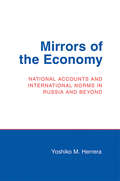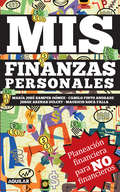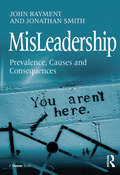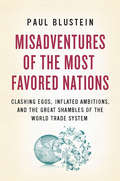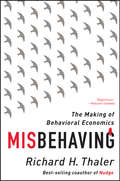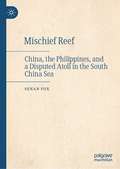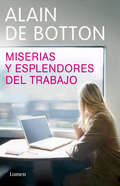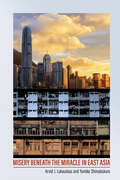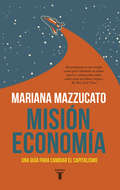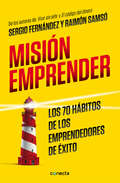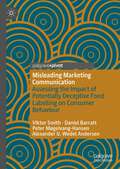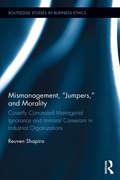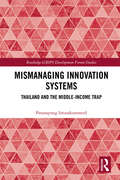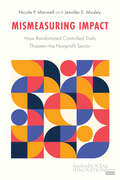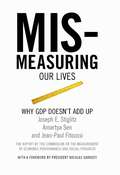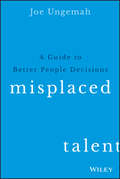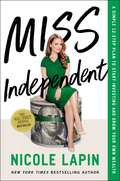- Table View
- List View
Miranda's Waning Protections: Police Interrogation Practices after Dickenson
by Welsh S. WhiteDid the Supreme Court's upholding of Miranda in 2000 adversely impact law enforcement, as conservatives have complained, or was it a reaffirmation of individual rights? Welsh S. White looks at both sides of the issue, emphasizing that Miranda represents just one stage in the Court's ongoing struggle to accommodate a fundamental conflict between law enforcement and civil liberties, and assessing whether the Court's present decisions (including Miranda) strike an appropriate balance between promoting law enforcement's interest in obtaining reliable evidence and the individual's interest in being protected from overreaching police practices.
Mirassou Vineyards (A)
by D. Daryl WyckoffExamines the decision by Mirassou to test a mechanical grape harvester that requires a major change in growing methods and operations. The machine is unproven and the investor has asked this vineyard to test it for him and commit to use it.
Mireles, el rebelde
by J. Jesús LemusMireles, el rebelde es un ensayo periodístico inédito donde Jesús Lemus, autor de Los malditos, construye un perfil del fundador de las autodefensas en México: José Manuel Mireles. En esta obra el autor desarrolla de forma analítica e informada su visión sobre José Manuel Mireles, fundador de las autodefensas en las zona de Michoacán y Guerrero, que sin duda nos ayudará a entender mejor el grave conflicto que se vive en esa zona de México y enriquecerá la discusión acerca de la seguridad nacional y la lucha contra el narcotráfico.En estas páginas el autor describe el momento y las circunstancias que orillaron a los habitantes de las zonas de Guerrero y Michoacán a levantarse en armas liderados por la iniciativa del Doctor Mireles. Sin caer en apologías adulatorias, el autor cuenta paso a paso el desarrollo de un malestar social generalizado que se convirtió en iniciativa de cambio social. El conflicto de las autodefensas en Michoacán es un tema de gran importancia en el ámbito nacional e internacional con repercute en temas como la violencia, la seguridad y el narcotráfico, y es por ese motivo que este ensayo encuentra una importancia fundamental para entender esta situación.
Mirror Mirror: Creating the Need for Change-Starting the Journey to Transformative Growth Through the Empowerment of Frontline Employees
by Vineet NayarWhen it comes to transforming your business for profitable growth, where do you begin? For CEO Vineet Nayar, who took the reins of IT services giant HCL Technologies in 2005, it began with an honest look in the corporate mirror. Although HCLT had surpassed $700 million in annual revenue and had a good track record of growth, it had begun to lose market share and, worse, mindshare-some of the company's most talented employees were leaving to work for competitors. In this chapter, Nayar describes what he calls the "Mirror Mirror" approach that set HCLT on the road to change. By communicating openly with employees and challenging them to acknowledge the reality of their company's trailing position, Nayar was able to clarify that the "value zone" of the company lay not in its array of technologies, but in the work of his frontline employees who, in their daily interactions, created customer value. In a bold move, he turned the corporate hierarchical pyramid upside down, making management accountable to those in the value zone instead of the other way around. The result was a complete transformation-and one that turned out to be both profitable and sustainable. This chapter was originally published as Chapter 1 of "Employees First, Customers Second: Turning Conventional Management Upside Down."
Mirrors of the Economy: National Accounts and International Norms in Russia and Beyond (Cornell Studies in Political Economy)
by Yoshiko M. HerreraAs international institutions multiply and more governments sign on to standardized ways of organizing economies and societies, resistance to globalization persists. In Mirrors of the Economy, Yoshiko M. Herrera explores the variance in implementation of international institutions through an examination of the international System of National Accounts (SNA) and, in particular, the success of post-Soviet Russia and other formerly communist countries in implementing the SNA. The SNA is the basis for all national economic indicators, including Gross Domestic Product, and is therefore a critical institution for economic policy and development. Herrera tests existing theories of implementation of international institutions and proposes a novel theoretical concept, "conditional norms," to suggest that the conditions attached to norms may result in institutional change. On the basis of content analysis of statistical publications and more than seventy-five interviews throughout Russia—particularly in Moscow—and in Washington, she forms a clear picture of the implementation of the SNA in Russia in the early 1990s. In Soviet times a stable conditional norm delineated the appropriateness of statistical institutions based on the structure of the economy. The transformation of the economic system triggered a shift in support among Russian and Eastern European statisticians in favor of the SNA. Herrera's argument increases our understanding of the role of norms, structural conditions, and professional communities in institutional implementation.
Mis finanzas personales
by Camilo Pinto Andrade Jorge Arenas Dulcey María José Samper GomezUna guía para aprender a manejar las finanzas. ¿ Por que muchas personas no prosperan financieramente?Es común ver quemuchas personas no logran avanzar financieramente, ni consolidar unpatrimonio, y mucho menos construir una vida de seguridad financiera.Independientemente de todas las dificultades de tipo social y económicoque resaltan en nuestros países latinoamericanos, es evidente el totalanalfabetismo que existe en relación con las finanzas personales y laadministración del dinero.Millones de personas gastan más de lo que seganan, viven con deudas exageradas, no saben en qué se gastan una partede sus ingresos, ven el ahorro y la inversión sólo como una posibilidadaccidental, y las palabras ?planificación financiera en finanzaspersonales? poco o nada tienen que ver con su vida cotidiana.El objetivode este libro es, con un lenguaje sencillo, poner a disposición de todotipo de personas los principios fundamentales y prácticos para construiruna vida de seguridad y tranquilidad financiera.Esta es la guía definanzas personales para los no financieros.¡Decida tomar control de sufuturo financiero HOY!
MisLeadership: Prevalence, Causes and Consequences
by Jonathan Smith John RaymentThe 'MisLeadership' of this book's title is a description of the phenomenon the authors have uncovered through their analysis of the validity, or otherwise, of current leadership styles and achievements, in the light of the challenges leaders face, and particularly of the urgent global issues with which business leaders are now confronted. John Rayment and Jonathan Smith examine existing approaches to leadership with a focus on their shortcomings, categorized according to the four main types of misLeadership the authors have identified - Missing, Misguided, Misinformed and Machiavellian leadership. Each of these forms of misleadership has a corollary in one of the four elements of the kind of holistic leadership that the authors advocate - the capacity for effective decision making, the adoption of a global perspective, the move to a new business paradigm to replace the current economic and social one, and commitment to a contemporary mission. From Rayment and Smith's passionately argued, but well reasoned perspective, leaders, the led and those responsible for leadership development will gain an insight into the prevalence and causes of misleadership and into ways in which it can be identified and overcome. A range of examples and case studies is provided to enable the concepts presented here to be related to practice. As well as illustrating instances of 'misleadership' these also demonstrate that the emphasis in relation to the decision making models currently available to leaders may not be the most important stages of the processes involved. The global perspective emphasized by the authors is not just about globality in the geographical sense. An important part of the way forward suggested here involves considering all aspects of humanity - the physical, mental and spiritual strength, stamina and fitness of individuals, groups and societies, in the context of a 'Global Fitness Framework'. All this is presented in a practical and approachable style that enables these authors to introduce a new approach to a key element of management thinking, in a way that will encourage and empower individuals to think on a different scale, challenge assumptions and exercise effective leadership.
Misadventures of the Most Favored Nations: Clashing Egos, Inflated Ambitions, and the Great Shambles of the World Trade System
by Paul BlusteinAn acclaimed expert on the global economy illuminates the human foibles, hidden agendas, and political follies that threaten the end of the globalization movement
Misbehaving: The Making of Behavioral Economics
by Richard H. ThalerGet ready to change the way you think about economics. Richard H. Thaler has spent his career studying the radical notion that the central agents in the economy are humans--predictable, error-prone individuals. Misbehaving is his arresting, frequently hilarious account of the struggle to bring an academic discipline back down to earth--and change the way we think about economics, ourselves, and our world. Traditional economics assumes rational actors. Early in his research, Thaler realized these Spock-like automatons were nothing like real people. Whether buying a clock radio, selling basketball tickets, or applying for a mortgage, we all succumb to biases and make decisions that deviate from the standards of rationality assumed by economists. In other words, we misbehave. More importantly, our misbehavior has serious consequences. Dismissed at first by economists as an amusing sideshow, the study of human miscalculations and their effects on markets now drives efforts to make better decisions in our lives, our businesses, and our governments. Coupling recent discoveries in human psychology with a practical understanding of incentives and market behavior, Thaler enlightens readers about how to make smarter decisions in an increasingly mystifying world. He reveals how behavioral economic analysis opens up new ways to look at everything from household finance to assigning faculty offices in a new building, to TV game shows, the NFL draft, and businesses like Uber. Laced with antic stories of Thaler's spirited battles with the bastions of traditional economic thinking, Misbehaving is a singular look into profound human foibles. When economics meets psychology, the implications for individuals, managers, and policy makers are both profound and entertaining.
Mischief Reef: China, the Philippines, and a Disputed Atoll in the South China Sea
by Senan FoxThis seven-chapter book examines the background to and consequences of the disputed occupation of Mischief Reef in the Spratly Islands group of the South China Sea (SCS) by the People’s Republic of China (PRC), from the mid-1990s to the present day. Although Mischief Reef has received significant media attention and has been discussed in academic journal articles and policy research reports, no books on the topic have appeared since a 30-page publication in 1996. By covering the topic in historical, domestic political, legal, economic, strategic, and geo-political terms, this book not only fills a gap on a particularly important issue with global consequences, but also acts as a follow-on to a previous Palgrave book by this author on another maritime dispute, Socotra Rock. This book will be of interest to journalists, scholars and legal theorists researching the implications of China's rise for maritime disputes in East Asia.
Miserias y esplendores del trabajo
by Alain de BottonUna reflexión irónica sobre el mundo del trabajo y del consumo El autor mismo define su libro como un himno a la inteligencia, peculiaridad, la belleza y el horror de los lugares de trabajo y al hecho extraordinario de que el trabajo sea, junto al amor, la principal fuente de sentido de nuestra vida. Hace poco más de un siglo, nuestros antepasados sabían todavía el origen preciso de lo que poseían y comían. Estaban familiarizados con los animales, las herramientas y tenían una relación cómplice con su entorno de trabajo. Ahora, todo nos llega envuelto en fundas cargadas de etiquetas y poco falta para que los niños crean que los pollos nacen en los supermercados. Dispuesto a romper esta barrera, Alain de Botton se aventura primero a darse un paseo por los muelles del puerto de Londres, para desplazarse luego a una fábrica de galletas en el interior del país, luego viaja a las Maldivas con los pescadores encargados de unafábrica de conservas para acabar en los despachos de una empresa que se dedica a la contabilidad. Lo que más le interesa es hablar con las personas que están cerca de los procesos productivos para ilustrar las peculiaridades del "homo faber", y las bondades de casi cualquier trabajo cuando lo examinamos de cerca. Tras estas conversaciones, nada es igual ya: la cereza que corona una galleta, la tapicería de un avión o una lata cualquiera de sardinas tienen a alguien con cara y ojos que estuvo al cargo de su proceso, y de repente el trabajo se vuelve algo menos abstracto y más cercano a los anhelos y las angustias del ser humano. Culto, irónico, maestro de la anécdota, Alain de Botton nos habla de Diderot y Voltaire mientras camina por los hangares de una gran fábrica y reflexiona sobre la naturaleza del arte mientras recorre las líneas de una central eléctrica. «Prepararse para la muerte con preceptos sabios es ofrecerle demasiado respeto. Dejemos que nos sorprenda mientras transportamos pasta de madera o buscamos la mejor manera de fabricar un frasco de perfume: hagamos que la muerte nos pille mientras hacemos algo para la vida.» Con estas palabras se cierra el libro y se abren un montón de puertas insólitas para el lector. La crítica ha dicho:«Si es que todavía hace falta hablar de las bondades de un escritor como Alain de Botton, pues les diré que en Miserias y esplendores del trabajo este hombre se supera a sí mismo en la perspicacia de sus reflexiones y en su complicidad con el ser humano.»Geoff Dyer «De Botton te lleva a pensar en cómo vives pero, sobre todo, en cómo podrías vivir.»The Times
Misery beneath the Miracle in East Asia (Studies of the Weatherhead East Asian Institute, Columbia University)
by Arvid J. Lukauskas Yumiko ShimabukuroMisery beneath the Miracle in East Asia challenges prevailing views of the East Asian economic miracle. Existing scholarship has overlooked the severity, persistence, and harmful consequences of the social-welfare crises affecting the region. Arvid J. Lukauskas and Yumiko Shimabukuro fill this gap and put a major asterisk on East Asia's economic record. Combining big-picture analysis, abundant data, a dynamic interdisciplinary framework, and powerful human stories, they shed light on the social ills that governments have failed to address adequately, including low wages, child abuse, elderly poverty, and substandard housing. One of the major forces behind the multidimensional welfare crises is the region's productivist welfare strategy, which prioritizes economic growth while abandoning a robust social safety net, leaving the most vulnerable segments of society largely unprotected. Misery beneath the Miracle in East Asia brings the region into debates over the dangers of seeking growth at all costs that are currently embroiling the United States and other advanced industrialized countries.
Misfit: autistic. gay. immigrant. changemaker.
by Andreas SouvaliotisUpdated and expanded: A new edition of the inspiring memoir by one of Canada's most unusual, successful and socially conscious businesspeople."I am different. I have always been different. I grew up scared of being found out, scared of my natural inability to fit in, to conform, to look and sound and dress and behave 'normal.' I was always drawn to the different ones and I observed them with fascination--but the thought of being even a little bit like them mortified me. I was desperate to fit in. . . ." --From MisfitAndreas Souvaliotis was raised at a time when being on the autism spectrum wasn't easily diagnosed or even discussed. Minds like his were simply considered odd. He also knew from an early age he was gay, and it terrified him as he was growing up with openly homophobic parents in one of Europe's least tolerant societies.Andreas's differences made him an outsider, right through to his mid-forties. And then suddenly, everything changed. Misfit is the extraordinary memoir of a man who realized there was strength in his strangeness, that it could be used as a force for good. "It all happened in a flash. On a beautiful spring morning in 2007, sitting in my backyard and licking my wounds from a spectacular career derailment, I came up with a big idea--and I found myself contemplating the most daring and unconventional pursuit of my life." The weird kid from Greece was on his way to making his world, and everyone's world, a better place.Andreas Souvaliotis's inspiring story shows us that everyone has what it takes to trigger positive change, and that none of us should see our differences and quirks as handicaps.
Misión economía: Una guía para cambiar el capitalismo
by Mariana Mazzucato¿Y si aplicáramos a nuestros problemas actuales el espíritu, la audacia y los medios que nos llevaron a la Luna? Una crítica contundente y muy necesaria del capitalismo moderno en la que la galardonada economista internacional sostiene que, para resolver las crisis a las que nos enfrentamos, debemos ser innovadores. Llegar a la Luna fue un extraordinario logro que requirió nuevas formas de colaboración entre los sectores público y privado, un altísimo nivel de compromiso y coordinación y la aceptación de riesgos y gastos muy elevados para alcanzar una meta a largo plazo. Inspirándose en las misiones del programa lunar, Mazzucato propone que se aplique ese mismo nivel de innovación a una serie de objetivos sociales, económicos y políticos clave con el fin de salir de nuestro estancamiento rumbo a un futuro más optimista. El capitalismo lleva tiempo paralizado y no ofrece respuestas a nuestros mayores problemas, como las epidemias, la desigualdad y la crisis ambiental. Se impone la necesidad de repensar el papel de los Estados en la economía y la sociedad, de orientar los presupuestos al largo plazo y de recuperar el sentido del interés público. Misión economía, cuyas ideas ya se están adoptando en todo el mundo, propone fijarse unos objetivos inspiradores e ilusionantes, entre los que se incluyen una prosperidad ampliamente compartida, unos servicios públicos de calidad para todos y una solución a la crisis climática. Según Mazzucato, los Estados pueden afrontar grandes desafíos y misiones ambiciosas, y su visión ofrece una salida a nuestro inmovilismo hacia un futuro más optimista. La crítica ha dicho...«Su propuesta es tan amplia como poco habitual: un nuevo relato convincente sobre cómo crear un futuro deseable.»The New York Times «Su defensa de un nuevo enfoque es abrumadora. Nos contagia con el tipo devisión, ambición e imaginación que tan desesperadamente necesitamos hoy.»The Guardian «Una visión oportuna y optimista. Aunque presenta sus argumentos de manera tan clara que pueden parecer obvios, lo cierto es que son revolucionarios.»Nature «Mazzucato sostiene que las sociedades deben abjurar de ideologías agotadas y adoptar el enfoque político que llevó a los astronautas en la Luna. Convincente y fascinante.»The Economist «Mazzucato critica la pobreza de la idea de que el único papel del gobierno es corregir las "fallas del mercado". Aboga por un sector público capaz de adaptarse a circunstancias cambiantes y nuevos desafíos.»Prospect «Mazzucato propone rediseñar el capitalismo a favor de las partes interesadas más que de los accionistas.»The Times «Desde 1969 nos preguntamos cómo los humanos pudieron llegar a la Luna y no logran resolver los problemas apremiantes aquí en la Tierra. Mariana Mazzucato ofrece la respuesta.»Financial Times «Una de las más ágiles pensadoras post-Brexit.»The Daily Mail «Según Mazzucato, años de privatizar empresas estatales y subcontratar servicios esenciales han dejado a los gobiernos debilitados e incapaces de beneficiar a la sociedad. Es el momento de que respalden objetivos audaces.»Reuters
Misión emprender: Los 70 hábitos de los emprendedores de éxito
by Raimon Samsó Sergio FernándezSergio Fernández y Raimon Samsó reúnen en este libro los 70 hábitos que nos convertirán en emprendedores de éxito y demuestran que ello depende más de la actitud, la mentalidad y, sobre todo, de los hábitos, que de los conocimientos adquiridos en cualquier universidad. Un libro para los héroes del siglo XXI: los emprendedores. El mercado laboral vive una verdadera revolución. Los empleos estables están desapareciendo y esto nos obliga a reinventarnos y a adaptarnos. En este contexto, cada vez más personas optan por emprender. Sin embargo, con frecuencia lo hacen sin la actitud, el conocimiento y el compromiso necesarios. El resultado es bien conocido: alrededor del 85% de los proyectos emprendedores fracasan antes de los cinco años, algo que podría evitarse con la preparación adecuada. Emprender no es un objetivo en sí mismo, una forma de ganar dinero o una salida laboral; emprender es una misión que dota de sentido a la vida, una manera de ofrecer nuestro valor a otros seres humanos y una transformación personal de gran calado: tu proyecto no crecerá más de lo que tú crezcas como persona. Los emprendedores de éxito son la humanidad del futuro. Personas hechas a sí mismas, en constante formación, motivadas, exigentes consigo mismas, apasionadas, educadas e instruidas, tolerantes, capaces de liderar, serviciales y colaboradoras, que aman lo que hacen y que se nutren espiritualmente. Este libro nos permitirá convertirnos en emprendedores de éxito de forma automática, simplemente incorporando los 70 hábitos imprescindibles para conducir nuestra vida al siguiente nivel tanto en el terreno personal como en el profesional. Una vez activados estos hábitos, el éxito será inevitable. Recuerda, tu misión: emprender.
Misleading Experiences: How to Spot This Common Cause of Flawed Decisions
by Sydney Finkelstein Jo Whitehead Andrew CampbellComplex decisions involving interpretation and judgment are difficult to get right. Especially considering the fact that our brains have developed decision making processes that rely heavily on our past experience. Misleading experiences are a common source of error in decision making that occur when the brain erroneously connects memories that seem similar to the situation we are currently assessing. But how do we know when an experience is misleading? In this chapter, the authors describe how to spot a misleading experience in advance and position yourself to strengthen the decision process, reducing the likelihood of making a bad decision. This chapter was originally published as chapter 5 of "Think Again: Why Good Leaders Make Bad Decisions and How to Keep It From Happening to You."
Misleading Marketing Communication: Assessing the Impact of Potentially Deceptive Food Labelling on Consumer Behaviour
by Viktor Smith Peter Møgelvang-Hansen Daniel Barratt Alexander U. Wedel AndersenUsing the case of food labelling, this book demonstrates that the line between fair and potentially misleading communication can be approached in empirical terms, supplementing the predominantly political and legal deliberations that determine how society deals with these issues. By first critically reviewing the legal conception of misleading commercial practices manifest in EU law, the authors discuss whether and how it can be transposed into empirically measurable terms. Presenting four complementary experimental studies targeting recurrent grey-zone scenarios on the Danish food market, the book illustrates the potential of the so-called ShopTrip test paradigm which simulates and registers real-life e-shopping behaviour as it unfolds while yielding new types of data against which opposing assessments of potential misleadingness can be matched. The results are discussed in the light of possible paths of theoretical explanation and implications for future regulative practices, including companies’ self-regulation.
Misleading Prejudgments: How to Spot This Common Cause of Flawed Decisions
by Sydney Finkelstein Jo Whitehead Andrew CampbellPrejudgments influence decisions because of the way we tag our thoughts with emotions. In decision making, it is the emotional tags that help us sort through the many possible interpretations we could make of a given situation and the many possible courses of action we could take. If the new situation is different from previous situations, prejudgments can inappropriately anchor our thinking, disrupt our objectivity, and make it hard for us to think things through afresh when circumstances change. Spotting prejudgments is critical to preventing flawed decision making, and in this chapter, the authors show you how to identify situations in which prejudgments might interfere with your assessment capabilities. This chapter was originally published as chapter 6 of "Think Again: Why Good Leaders Make Bad Decisions and How to Keep It From Happening to You."
Mismanagement, “Jumpers,” and Morality: Covertly Concealed Managerial Ignorance and Immoral Careerism in Industrial Organizations (Routledge Studies in Business Ethics)
by Reuven ShapiraExecutives’ morality and ethics became major research topics following recent business scandals, but the research missed a major explanation of executives’ immorality: career advancement by "jumping" between firms that causes ignorance of job-pertinent tacit local knowledge, tempting "jumpers" to covertly conceal this ignorance. Generating distrust and ignorance cycles and mismanagement, this choice bars performance-based career advancement and encourages immoral careerism, advancing by immoral subterfuges. Such careerism is a known managerial malady, but explaining its emergence proved challenging as managerial ignorance is covertly concealed as a dark secret on organizations’ dark side by conspiracies of silence. Managerially educated and experienced, Dr. Shapira achieved a breakthrough by a 5-year semi-native anthropological study of five "jumper"-managed automatic processing plants and their parent firms. This book untangles common ignorance and immoral careerism, concealed as dark secrets by executives who "rode" on the successes of mid-level "jumpers" who high-morally risked their authority and power by admitting ignorance and trustfully learned local tacit knowledge. The opposite choice tendencies accorded power, authority, and status rankings, which made practicing immorality easier the higher one’s position, suggesting that the common "jumping" between managerial careers nurtures immoral executives similar to those exposed in the recent business scandals.
Mismanaging Innovation Systems: Thailand and the Middle-income Trap (Routledge-GRIPS Development Forum Studies)
by Patarapong IntarakumnerdOnce recognised as a high-performing newly industrialising Asian economy with the potential for economic and developmental success similar to South Korea, Taiwan, Hong Kong and Singapore, Thailand’s growth rate and competitive edge have declined substantially. With slower adoption and movement towards the knowledge-intensive industries, the loss of the competitive edge is a cause of growing concern among Thai policymakers, with Thailand succumbing to the middle-income trap. This book analyses Thailand’s declining competitiveness in the past 50 years, considering both the national and sectoral roles and capabilities of key players, including the government, universities and research institutes, as well as the electronics, food, and automotive industries. Including comparative analyses with other Asian nations, this book is a must-read for both students and practitioners with interests in development economics, industrial economics and public policy.
Mismeasuring Impact: How Randomized Controlled Trials Threaten the Nonprofit Sector (Stanford Social Innovation Review Books)
by Nicole Marwell Jennifer MosleyThe hidden dangers of randomized controlled trials The need to demonstrate the effectiveness of nonprofit social programs has led to a rapid rise in the use of randomized controlled trials (RCTs), for evaluation. As a result, most nonprofit sector professionals can tell you why nonprofits should do an RCT. This book tells you why they probably shouldn't, and what to do instead. Mismeasuring Impact explores why RCTs are being embraced as the "gold standard" for nonprofit evaluation, despite the high cost and time investment required and the serious problems with using RCTs in a nonprofit context. (Most RCTs conducted in nonprofits fail to meet required standards for rigor, undercutting their accuracy). The book describes what happens inside nonprofits when they take part in RCTs, the unintended equity issues that arise, and why nonprofits feel pressured participate in RCTs despite the problems. University of Chicago professors Marwell and Mosley's research is based on extensive interviews with key players: nonprofit managers, professional program evaluators, and program officers in philanthropic foundations. The book argues that, ultimately, RCTs are used to poorly ground nonprofit legitimacy, not to foster nonprofit improvement. RCTs also privilege program and organizational standardization over the key strengths of nonprofit organizations: flexible innovation and responsiveness to community needs. Nonprofits and funders need forms of evaluation that lift up these strengths. Mismeasuring Impact offers alternative approaches that build strong organizations, not just cookie-cutter programs, and which funders and nonprofits of all sizes can support.
Mismeasuring Our Lives
by Amartya Sen Joseph E. Stiglitz Jean-Paul FitoussiIn February of 2008, amid the looming global financial crisis, President Nicolas Sarkozy of France asked Nobel Prize-winning economists Joseph Stiglitz and Amartya Sen, along with the distinguished French economist Jean Paul Fitoussi, to establish a commission of leading economists to study whether Gross Domestic Product (GDP)-the most widely used measure of economic activity-is a reliable indicator of economic and social progress. The Commission was given the further task of laying out an agenda for developing better measures.Mismeasuring Our Lives is the result of this major intellectual effort, one with pressing relevance for anyone engaged in assessing how and whether our economy is serving the needs of our society. The authors offer a sweeping assessment of the limits of GDP as a measurement of the well-being of societies-considering, for example, how GDP overlooks economic inequality (with the result that most people can be worse off even though average income is increasing); and does not factor environmental impacts into economic decisions.In place of GDP, Mismeasuring Our Lives introduces a bold new array of concepts, from sustainable measures of economic welfare, to measures of savings and wealth, to a "green GDP." At a time when policymakers worldwide are grappling with unprecedented global financial and environmental issues, here is an essential guide to measuring the things that matter.
Misplaced Talent
by Joe UngemahHigh-value talent management must be relevant to today's workplace Misplaced Talent takes a hard look at the cluttered field of Talent Management, and offers a clear guide to making better people decisions in any organization. Deliberately challenging practitioners to do more, this insightful discussion sorts through the tools and techniques developed over the last century to examine their true relevance to the modern workplace. You'll learn which activities show the greatest potential to improve the lives of employees and the organizations they work for, and identify which of your existing practices don't really add enough value to be worth the expenditure of time, money, and potentially lost talent. The author asks you to make up your own mind about which approaches work best for your own specific talent decisions, but provides the best theory and practice available today as a foundation upon which to formulate a more relevant strategy. In a world of big data, the potential to understand employees and react appropriately has never been greater. So why is Talent Management as an industry relying on outdated theory and practices? This book is a guide to bringing HR up to date, giving you the tools, techniques, and perspective you need to demonstrate more value to your organization. Adopt the tools and techniques most effective in today's workplace Identify and discard methods that don't add value to the organization Implement critical changes that can transform the HR function Make better people decisions based on psychology and research Fundamentally, not much has changed in what constitutes good people practice. Practitioners must demonstrate the value of Talent Management, but the solutions implemented often fall short of the rigor and discipline they deserve. Misplaced Talent provides the insight you need to refocus attention and engage your organization about the value of better people decisions.
Miss Independent: A Simple 12-Step Plan to Start Investing and Grow Your Own Wealth
by Nicole LapinNew York Times bestselling author of Rich Bitch and renowned money expert Nicole Lapin makes investing accessible and fun so women can make bank and become Miss Independent.You&’ve worked hard for your money and now it&’s time for your money to work for you. You will never earn or budget your way into real wealth. Growing your money significantly doesn&’t require starting with a lot of money. It requires a little bit of knowledge about taking smart risks and as much time as possible to take advantage of the glorious power of compound interest, which Einstein refers to as the eighth wonder of the world.From automating your savings to easy, no-stress investing strategies, Nicole will teach you how to take your financial knowledge and portfolio to the next level and start you on your journey to your ultimate destination: true financial independence.In Miss Independent, you will learn:The freedom that wealth affords you, whether it&’s the ability to leave a crappy job or significant other, go on the vacation of your dreams or otherwise live life on your own terms. The best method for establishing your &“number&”—the amount of wealth you want to accumulate before you retire—and getting it.The meaning of the most common investing terms, like stocks and bonds, (and some more exotic ones like REITs or cryptocurrency) and how to make them work to your advantage.The ins and outs of big financial decisions and concepts, like taking out a mortgage, owning investment properties, and buying life insurance.Miss Independent takes the fear out of money management and investing once and for all. Using her own vulnerable stories and her signature conversational style, let Nicole show you all the different ways and paths that you can take to become financially free at last.



